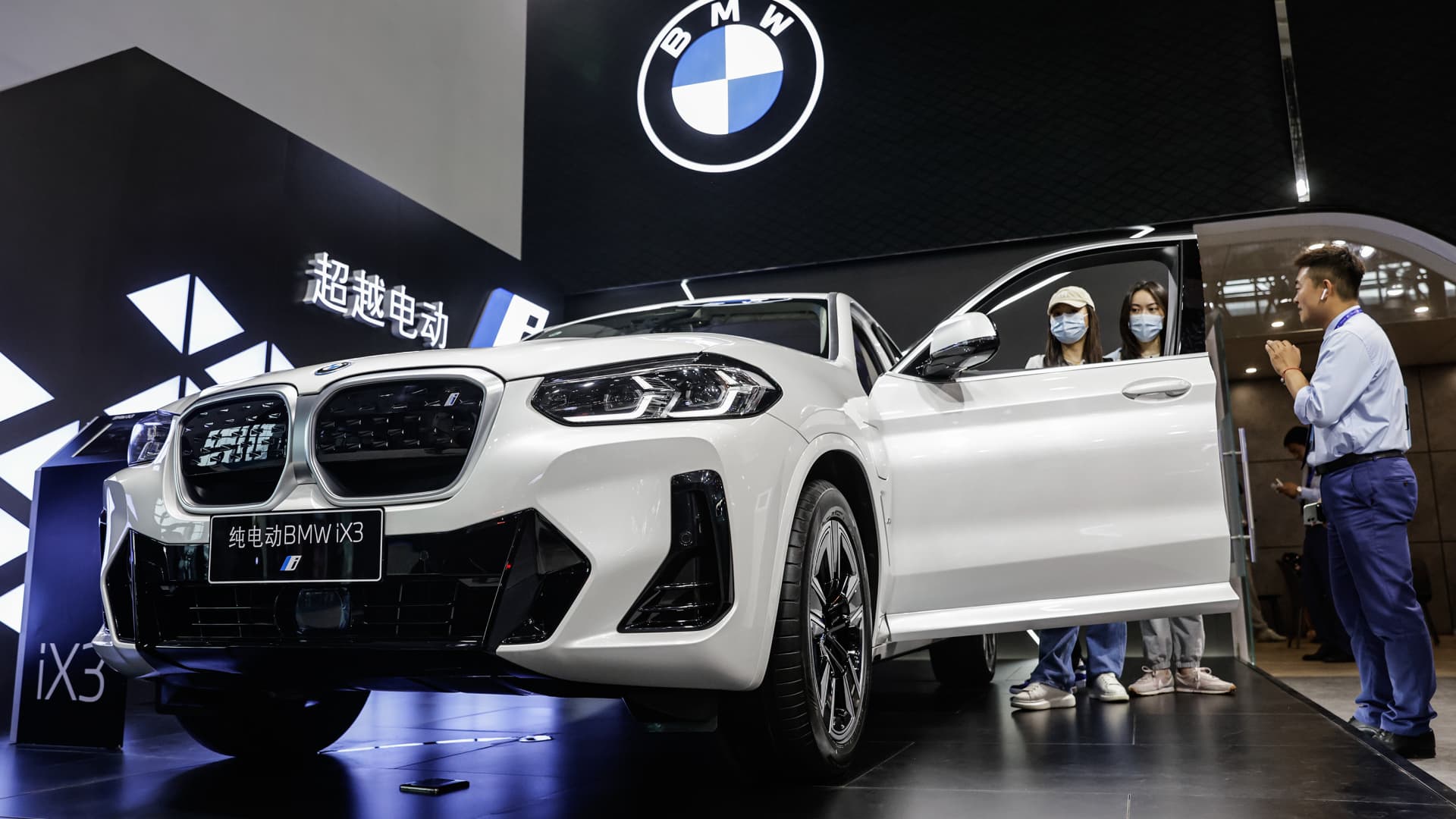German automaker BMW Group said that diversifying its supply chains away from China does not mean it is leaving the country completely.
“We always try to diversify our risks. This is not leaving a country or leaving a specific region,” CEO Oliver Zipse told CNBC’s Martin Soong in an exclusive interview.
“Especially the BMW Vision Neue Klasse, it will not be a small volume. So we need large suppliers – we need more than one anyway,” said Zipse, during the Japan Mobility Show 2023. BMW revealed its new electric concept car, Vision Neue Klasse, in September as it looks to take on Tesla.
BMW is not leaving China, he said, adding that free trade is “fundamental to our business model.”
In July, Germany had urged companies to “de-risk” from China, warning that Beijing’s economic strategy aims to make it less dependent on other countries, while making international production chains more dependent on China.
“For Germany, China remains a partner, a competitor, a systemic rival. But the aspect of systemic rivalry has become increasingly prominent in recent years,” Germany’s foreign minister Annalena Baerbock had said at that time.
“This is having an impact on European and global security,” the German foreign ministry said in a 64-page report.
Earlier this month, the European Union launched a probe into subsidies for China-made electric vehicles exported to Europe, following a surge in EU imports of such vehicles from China.
European Commission President Ursula von der Leyen said on Sept. 13 that the “global market is flooded with cheaper electric vehicles” at “artificially low” prices owing to “huge state subsidies.”
“It may result in the Commission levying countervailing tariffs on EU imports of battery EVs from China to offset state subsidies, if substantiated, and to level the playing field,” according to a notice published by the European Commission on Oct. 4.
BMW manufactures cars, including EVs, in China and exports them to Europe. China has become a global manufacturing and export hub for EVs for the likes of BMW and Tesla thanks to the increasing competitiveness of Chinese EVs, cost advantages of production and and large production capacity, said the Center for Strategic & International Studies.
In 2022, the German automaker opened its $2.2 billion factory in Shenyang with a strong focus on producing EVs.
BMW produces the iX3 EV in China and exports them to Europe and will export the electric Mini Cooper starting next year, making it vulnerable to possible EU tariffs on imports from China.
In response to the EU’s probe, Zipse said that BMW is a “global player.”
“We are at home in Europe. We are at home in China. We are at home in the U.S. We, of course, are at home here in Japan even more. So that’s why we are here. And we always foster and speak for free trade worldwide,” said Zipse.
“This ground principle of a working economy and only the free trade can really drive our effects on the climate down – with free trade, with technologies from all over the world, with free access to raw materials, and especially implementing them in all technologies,” said Zipse.
BMW’s CFO Walter Mertl said he did not endorse punitive tariffs, arguing the EU investigation would do more harm for carmakers doing business in China and protect those who do not have significant sales in China, according to a Reuters report.

where to buy ivermectin – buy candesartan online carbamazepine pills
accutane 40mg sale – order linezolid 600 mg generic order zyvox 600 mg generic
purchase amoxil generic – buy amoxicillin generic combivent 100 mcg pill
purchase azithromycin pills – purchase bystolic generic brand bystolic
cheap prednisolone generic – order progesterone without prescription buy progesterone online cheap
furosemide sale – buy generic betnovate 20gm3 betamethasone 20 gm over the counter
neurontin 100mg cheap – gabapentin us order sporanox 100mg sale
clavulanate brand – order cymbalta 40mg pills oral duloxetine 20mg
buy doxycycline pills for sale – albuterol 4mg pill buy glucotrol pill
buy augmentin cheap – nizoral 200mg without prescription cymbalta 40mg tablet
cialis for daily use – cialis 40mg for sale cheap sildenafil 50mg
viagra online order – cheap tadalafil without prescription cialis 40mg cost
atorvastatin 10mg ca – lipitor 10mg for sale order lisinopril online
generic cenforce 100mg – purchase cenforce without prescription buy glycomet
order atorvastatin 80mg generic – order lipitor sale order generic lisinopril 5mg
order prilosec 20mg for sale – lopressor where to buy atenolol without prescription
cost clarinex 5mg – desloratadine where to buy buy priligy 60mg online cheap
order generic cytotec – cytotec 200mcg tablet buy diltiazem sale
buy zovirax 400mg – crestor price where can i buy rosuvastatin
buy domperidone 10mg generic – buy flexeril 15mg without prescription buy flexeril 15mg online
buy domperidone 10mg online cheap – flexeril 15mg oral flexeril over the counter
coumadin where to buy – buy metoclopramide 10mg losartan over the counter
purchase levofloxacin pills – avodart 0.5mg sale buy ranitidine online
buy esomeprazole 40mg for sale – nexium 20mg cost buy sumatriptan 25mg online
buy mobic 15mg generic – order meloxicam 7.5mg flomax 0.2mg canada
ondansetron 4mg cheap – spironolactone 100mg us order zocor generic
order valtrex 1000mg online cheap – buy proscar 5mg online cheap buy fluconazole 100mg pill
order modafinil buy modafinil 100mg buy provigil sale generic provigil 200mg provigil buy online order modafinil 200mg pills buy cheap generic modafinil
With thanks. Loads of knowledge!